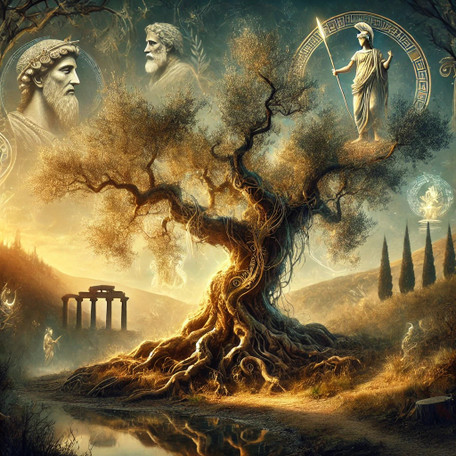The Mythology of Olive Trees: Legends and Stories from Ancient Cultures
10th Aug 2024
The Mythology of Olive Trees: Legends and Stories from Ancient Cultures
Ah, the olive tree! A symbol of peace, wisdom, and prosperity, this venerable tree has woven its roots deep into the fabric of human civilization. But beyond its practical uses as a source of food and oil, the olive tree has been the subject of countless myths, legends, and stories passed down through the ages. From the ancient Greeks to the Hebrews, from the Romans to the Egyptians, the olive tree has stood as a sacred symbol, a living link between the divine and the mortal, the past and the present. So, grab your toga, light your olive oil lamp, and join me on a journey through the mythology of olive trees, where gods, goddesses, and heroes come to life among the ancient groves.
The Olive Tree in Greek Mythology: A Gift from the Gods
Let’s start our journey in ancient Greece, a land where mythology was as much a part of daily life as the olive tree itself. The Greeks, who were among the first to cultivate olive trees, held the olive in high esteem, and it’s no surprise that this noble tree features prominently in their myths and legends.
The Contest of Athena and Poseidon
One of the most famous stories involving the olive tree is the tale of how the city of Athens got its name. The story goes that the gods Athena and Poseidon, both desiring to be the patron deity of a new city in Attica, engaged in a contest to see who could give the city the most valuable gift. Poseidon, the god of the sea, struck the ground with his trident and created a saltwater spring, symbolizing naval power and the prosperity of the sea. However, the water was salty and not very useful for the inhabitants.
Athena, the goddess of wisdom, responded by striking the ground with her spear and creating the olive tree. The olive tree provided the people with wood, oil, and food—resources that were essential for their survival and prosperity. The citizens of the city, recognizing the greater value of Athena’s gift, chose her as their patron, and the city was named Athens in her honor. The olive tree thus became a symbol of wisdom, peace, and prosperity, and Athena was often depicted with an olive branch or wreath.
This myth not only underscores the significance of the olive tree in ancient Greek society but also highlights the tree’s association with wisdom and civilization. The olive tree, with its ability to thrive in harsh conditions and its long lifespan, symbolized the endurance and resilience of the Athenian people.
The Olive Tree in the Odyssey: A Symbol of Stability and Endurance
The olive tree also appears in Homer’s epic poem, The Odyssey, which recounts the adventures of the hero Odysseus as he attempts to return home after the Trojan War. In one of the most famous scenes in the epic, Odysseus reveals his identity to his wife, Penelope, by describing their marriage bed, which he had crafted himself from the trunk of an olive tree. The bed was immovable, rooted in the ground, and thus symbolized the steadfastness and enduring nature of their love and marriage.
This symbolism of the olive tree as a representation of stability and endurance is particularly poignant given the trials that Odysseus and Penelope faced during their twenty-year separation. Just as the olive tree endures through drought and hardship, so too did their love and commitment to each other. The image of the olive tree as a symbol of enduring love and fidelity resonates throughout the epic and adds a layer of depth to the characters and their relationship.
The Olive Crown: A Prize for the Victorious
In addition to its association with wisdom and stability, the olive tree was also a symbol of victory and honor in ancient Greece. Victors in the ancient Olympic Games, which were held in Olympia in honor of Zeus, were awarded crowns made from olive branches, known as kotinos. These crowns were considered the highest honor a Greek athlete could receive, symbolizing not just physical prowess but also the favor of the gods.
The olive crown was believed to bring peace, prosperity, and protection to the victor and their city. It was a reminder that true victory was not just about physical strength but also about the wisdom, perseverance, and favor of the divine—qualities embodied by the olive tree.
The Olive Tree in Roman Mythology: A Symbol of Peace and Prosperity
The Romans, like the Greeks, revered the olive tree and incorporated it into their mythology and rituals. The olive tree was a symbol of peace, prosperity, and the enduring power of the Roman state. The goddess Minerva, the Roman counterpart of Athena, was also associated with the olive tree, and it was believed that she brought the knowledge of olive cultivation to the people of Italy.
The Peace of Augustus: The Olive Branch as a Symbol of Peace
One of the most enduring symbols of the olive tree in Roman culture is the olive branch as a symbol of peace. This symbolism became particularly significant during the reign of Augustus, the first Roman emperor. After years of civil war and unrest, Augustus brought peace to the Roman Empire, a period known as the Pax Romana. The olive branch, which was often depicted in art and coinage during this time, symbolized the peace and stability that Augustus brought to the empire.
The use of the olive branch as a symbol of peace has persisted through the centuries and is still recognized today. It is often used in diplomatic contexts and appears on the flag of the United Nations, representing the organization’s commitment to maintaining peace and security in the world.
The Olive Tree and the Founding of Rome
The olive tree also played a role in the founding myth of Rome. According to legend, Romulus and Remus, the twin brothers who founded Rome, were abandoned as infants and left to die in a basket on the banks of the Tiber River. They were saved and suckled by a she-wolf and later discovered by a shepherd. The spot where the she-wolf cared for the twins was said to be near an olive tree, symbolizing the prosperity and endurance of the city they would go on to establish.
The connection between the olive tree and the founding of Rome underscores the tree’s symbolic importance in Roman culture. Just as the olive tree is resilient and able to thrive in challenging conditions, so too was the city of Rome, which grew from humble beginnings to become one of the most powerful empires in history.
The Olive Tree in Hebrew Tradition: A Covenant with the Divine
The olive tree also holds deep significance in Hebrew tradition, where it is frequently mentioned in the Bible as a symbol of peace, prosperity, and divine blessing. One of the most well-known stories involving the olive tree is the story of Noah’s Ark.
The Dove and the Olive Branch: A Symbol of Peace and Reconciliation
After the great flood, Noah sent out a dove to see if the waters had receded. The dove returned with an olive leaf in its beak, signaling that the flood had ended and that dry land had appeared (Genesis 8:11). This moment marked the beginning of a new covenant between God and humanity, with the olive leaf symbolizing peace, renewal, and the restoration of life.
The image of the dove with an olive branch has since become one of the most enduring symbols of peace and reconciliation in Western culture. It represents the hope for a new beginning and the promise of a brighter future, a theme that resonates across many religious and cultural traditions.
The Olive Tree as a Symbol of Israel
In the Bible, the olive tree is also used as a metaphor for the people of Israel. The prophet Jeremiah compares Israel to a “green olive tree, fair, and of goodly fruit” (Jeremiah 11:16), symbolizing the nation’s beauty, strength, and divine favor. The olive tree’s deep roots and ability to thrive in harsh conditions were seen as reflective of the enduring covenant between God and the people of Israel.
The olive tree’s symbolism in Hebrew tradition extends beyond the religious to the practical. Olive oil was a central part of daily life in ancient Israel, used for cooking, lighting lamps, anointing priests and kings, and as a symbol of blessing and abundance. The olive tree, therefore, represented not just spiritual but also material prosperity, a gift from God that sustained the people in both body and soul.
The Olive Tree in Egyptian Mythology: A Tree of Life and Healing
While the olive tree is not native to Egypt, it nevertheless found its way into Egyptian mythology and culture, particularly through trade and cultural exchange with the Mediterranean. The ancient Egyptians valued olive oil for its healing properties and used it in religious rituals, cosmetics, and medicine.
The Olive Tree in the Land of the Dead
In Egyptian mythology, the olive tree was associated with the afterlife and the gods who ruled over it. The ancient Egyptians believed that the olive tree had the power to grant eternal life and protect the deceased in the afterlife. Olive oil was used in the mummification process, anointing the bodies of the dead to purify and preserve them for eternity.
Olive branches were also placed in tombs as offerings to the gods, symbolizing the hope for eternal peace and the renewal of life after death. The olive tree, therefore, was not just a symbol of earthly prosperity but also of spiritual immortality, a link between the world of the living and the realm of the gods.
The Healing Power of Olive Oil
The ancient Egyptians also believed in the healing properties of olive oil, which was used in a variety of medicinal treatments. Olive oil was mixed with herbs and other ingredients to create ointments and salves for wounds, skin conditions, and other ailments. It was also used in religious rituals to purify and protect the body and soul.
The association of olive oil with healing and purification is a theme that recurs in many ancient cultures, reflecting the universal belief in the sacred and life-giving properties of the olive tree. In Egyptian mythology, as in Greek and Hebrew tradition, the olive tree was seen as a gift from the gods, a source of life, health, and divine blessing.
The Olive Tree in Other Cultures: A Universal Symbol
While the olive tree is most closely associated with the Mediterranean, its symbolism and significance extend far beyond this region. In cultures around the world, the olive tree has come to represent peace, prosperity, and the enduring power of nature.
The Olive Tree in Hinduism
In Hinduism, the olive tree is associated with the goddess Lakshmi, the deity of wealth, prosperity, and abundance. Olive oil is used in lamps during religious ceremonies and rituals, symbolizing the light of knowledge and the blessings of the goddess. The olive tree, therefore, is a symbol of both material and spiritual prosperity, a reminder of the divine presence in all aspects of life.
The Olive Tree in Celtic Tradition
In Celtic tradition, the olive tree was revered as a symbol of wisdom, protection, and longevity. The Celts believed that the olive tree had the power to ward off evil spirits and bring good fortune to those who planted it near their homes. Olive branches were often used in rituals and ceremonies to invoke the protection of the gods and to bless new ventures and journeys.
The Olive Tree in Islam
In Islamic tradition, the olive tree is mentioned in the Quran as a symbol of light and guidance. The Quran refers to the olive tree as a “blessed tree” and compares it to a light that shines forth from a lamp, illuminating the way for those who seek the truth (Surah An-Nur 24:35). The olive tree, therefore, represents the divine light of knowledge and wisdom, guiding humanity on the path to righteousness.
Conclusion: The Timeless Legacy of the Olive Tree
As we’ve journeyed through the myths and legends of ancient cultures, it’s clear that the olive tree is more than just a plant—it’s a symbol that has transcended time, geography, and culture. From the olive groves of ancient Greece to the tombs of Egypt, from the sacred texts of the Hebrews to the rituals of the Celts, the olive tree has been revered as a gift from the gods, a source of life, wisdom, and peace.
In a world that is constantly changing, the olive tree stands as a symbol of endurance and resilience, a reminder of the deep connections between humanity, nature, and the divine. Its roots stretch deep into the earth, anchoring it in the soil of history, while its branches reach towards the sky, seeking the light of the future.
So the next time you drizzle olive oil over your salad, light an olive oil lamp, or walk through a grove of ancient olive trees, take a moment to reflect on the rich tapestry of stories, myths, and legends that have been woven around this sacred tree. The olive tree is not just a part of our past—it is a living symbol of our shared humanity, a bridge between the ancient and the modern, the mundane and the divine.






